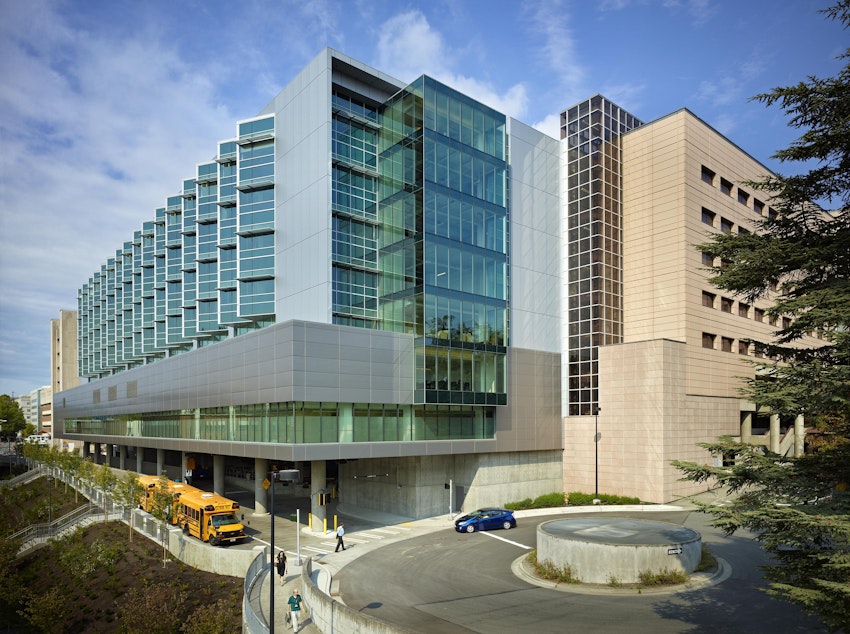Washington hospitals are hoping for the best, preparing for the worst

The region’s hospitals are bracing themselves for what they’re hoping WON’T come: a big surge in patients sick with COVID-19.
KUOW reporter Anna Boiko-Weyrauch spoke with Morning Edition host, Angela King with an update on what hospitals are seeing and how they're preparing for more patients with COVID-19.
Angela King: Anna, what’s the latest?
Anna Boiko-Weyrauch: I’ve been speaking with some folks on the front lines in emergency departments and they say they are not being overwhelmed right now.
That’s thanks to some measures that hospitals enacted in the past few weeks: postponing surgeries, opening up testing sites, telling people to stay away from the ERs.
Anecdotally, I’m hearing from folks that overall volumes in emergency departments and ICUs are down because people are staying away or getting their care elsewhere. But the number of people with respiratory symptoms – or COVID-19 like symptoms – specifically seems to be rising.
Sponsored
Right now hospitals are running numbers, making projections for how many people might need hospital care when, and they say the next few weeks are going to be key. Cassie Sauer is the CEO of the Washington State Hospital Association. She told me hospitals are hoping for the best, but preparing for the worst.
Cassie Sauer: “We don’t know what’s going to be next. So we are planning for a significant spike in patients and hoping it doesn’t come.”
Angela King: What are they doing to prepare for the worst?
Anna Boiko-Weyrauch: Hospitals have these big, detailed documents called surge plans that outline how hospitals will care for patients if there’s a flood of people coming into hospitals. And the Washington State Hospital Association says they are not in a surge situation right now, by the way.
But, let me walk you through how they’re thinking about this.
Sponsored
There are three "S’s" that go into surge planning: Space, staff, and stuff. So, you need people, places and supplies to care for patients. You need all three at the same time.
Angela King: You need all three, but let’s go one at a time. Let’s start with space. What are hospitals doing?
Anna Boiko-Weyrauch: A few different things. It’s all about creating and reserving space for people who might get really, really sick. To create that space they are freeing up the beds they have, canceling or postponing surgeries for example, or they’re looking to discharge patients who don’t need to be there anymore.
Also, there’s a big push to care for people outside of the ERs, using phone calls or telemedicine for example.
Sponsored
And then, this week there’s work starting up to find what’s known as alternate care sites for sick people. Sauer with the hospital association told me they’re working with the state to find places outside the hospital for people who might get sick from COVID-19.
Cassie Sauer: “There’s also people who get sick and need hospital care but they don’t need intensive care. They don’t need ventilator support. They need oxygen, they need fluids, they need nursing care, but they could potentially be cared for in alternate care sites, not in a hospital.”
Angela King: Ok, what about the next part – staff?
Anna Boiko-Weyrauch: I spoke with someone who is thinking a lot about that right now. Dr. Laura Evans is the associate medical director for critical care at the UW Medical Center. She’s putting together contingency plans if they need more staff in the ICU.
Laura Evans: “From the construct of what that team looks like down to filling out the actual schedules with names in it. For example, Laura’s on next week overnight.”
Sponsored
Dr. Evans told me postponing surgery, like UW medical center has done, also helps free up medical staff in case there’s a surge in patients.
And she said they have plans to train healthcare workers from other areas of the hospital, like nurses from the operating room to work in the intensive care unit. Right now, by the way, she said the UW Medical Center ICU is operating well within capacity.
Angela King: And lastly, Anna, what about stuff? What’s the latest with the supplies hospitals need?
Anna Boiko-Weyrauch: It’s still a huge issue. Some places are critically low on things like masks, gowns, and gloves.
The state got another shipment of personal protective equipment from the national stockpile over the weekend, but it’s not everything they asked for.
Sponsored
In the meantime, local communities have been stepping up. Some manufacturers are looking to repurpose their operations to make supplies locally. And individuals and businesses have also been donating supplies.
The hospital association says they love it and please keep it up.





